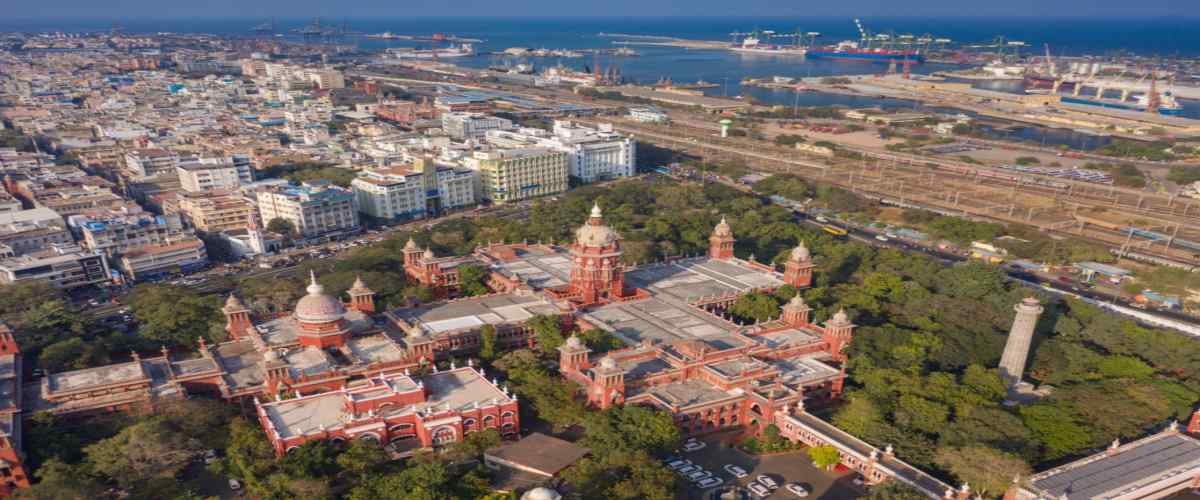Commercial property investment in India is a dynamic realm with the potential for significant returns. However, staying informed about the latest market trends is paramount for success. In this blog post, we’ll delve into the current trends in commercial property investment for 2023 and beyond. These insights will empower you to navigate the ever-evolving market and make well-informed investment decisions.

Things we covered for you
Overview of the Indian Commercial Property Investment Market

Current market size and value: The commercial property market in India is a colossal entity, potentially valued at over ₹4 trillion. While this figure might appear daunting, it underscores the vast opportunities available in our nation.
Historical performance and growth trends: Commercial real estate in India has a history of delivering consistent returns, often surpassing other investment options such as stocks and bonds over the long term. It’s essential to understand, though, that this market can exhibit short-term fluctuations.
Market segmentation: Commercial property in India spans various asset types, including office spaces, retail centres, industrial warehouses, multifamily housing, hospitality, healthcare, and more. Each segment has its unique dynamics and trends, requiring careful consideration when choosing your niche.
Key players and stakeholders in the industry: The Indian commercial property investment landscape features a diverse range of participants, from individual investors to institutional giants, developers, brokers, lenders, property managers, and tenants. Grasping the roles of these players is pivotal for success.
Emerging Markets and Regions with High Growth Potential in India
India, with its rapid urbanization and economic growth, offers several emerging markets and regions that present exciting opportunities for commercial property investors. Understanding these regions and their unique dynamics is key to making informed investment decisions.
A. Pune: The IT Hub

Why Invest in Commercial Markets in Pune?
Read: Top 10 Villa Projects in Hyderabad – Location, Amenities and Prices
Pune, often referred to as the “Oxford of the East” due to its educational institutions, has transformed into a vibrant IT hub. The presence of several multinational IT companies has created a robust demand for office spaces. Additionally, Pune’s young workforce and quality infrastructure make it an attractive destination for businesses.
Investment Opportunities:
- Tech Parks: Investing in tech parks and IT office spaces can yield stable rental incomes due to the continuous demand from IT companies.
- Educational Infrastructure: With numerous colleges and universities, there’s a demand for student accommodation and mixed-use developments.
B. Hyderabad: The Pharma and IT Confluence

Why Invest in Commercial Markets in Hyderabad?
Hyderabad is a unique blend of pharmaceutical and IT industries. It’s home to major pharmaceutical companies and global IT giants. The city’s proactive government policies and skilled workforce make it a thriving investment destination.
Investment Opportunities:
- Pharmaceutical Zones: Investing in commercial properties around pharmaceutical clusters can be lucrative due to the growing demand for research and development spaces.
- Co-working Spaces: With the rise of startups and freelancers, co-working spaces are in high demand, offering diverse investment opportunities.
C. Ahmedabad: The Industrial and Manufacturing Hub

Why Invest in Commercial Markets in Ahmedabad?
Read: A Complete List of the Top Investment-worthy Tier 2 Cities in India
Ahmedabad is a prominent industrial and manufacturing hub in India. The city’s strategic location, excellent connectivity, and government initiatives like the “Make in India” campaign have attracted significant investments.
Investment Opportunities:
- Industrial Warehouses: Warehousing spaces are in demand due to Ahmedabad’s role as a major logistics and distribution center.
- Manufacturing Units: Investing in spaces suitable for small and medium-scale manufacturing units can provide steady rental income.
D. Chennai: The Automotive and Electronics Center

Why Invest in Commercial Markets in Chennai?
Chennai is a significant hub for the automotive and electronics industries in India. The presence of automobile manufacturers and technology companies has created a strong demand for industrial and office spaces.
Investment Opportunities:
- Industrial Parks: Investing in industrial parks catering to the automotive and electronics sectors can offer stable rental returns.
- Office Spaces: Providing office spaces with modern amenities tailored for tech companies can attract high-quality tenants.
E. Kochi: The Emerging IT and Tourism Destination

Why Kochi?
Kochi, nestled in the picturesque state of Kerala, is emerging as an IT destination and a popular tourist spot. The city’s serene environment and growing IT sector make it an appealing investment choice.
Investment Opportunities:
- IT Parks: Investing in IT parks and office spaces for IT companies can yield long-term growth as the sector expands.
- Hospitality Sector: With a burgeoning tourism industry, investing in hotels and resorts can provide a steady stream of income from both domestic and international tourists.
Emerging Market Trends
A. Shifts in Demand
1. The impact of remote work on office space demand: The surge in remote work, accelerated by the COVID-19 pandemic, is reshaping the office market in India. Some companies are downsizing their office requirements, while others are exploring flexible workspace solutions. Investors should adapt to these evolving dynamics.
Read: GST on Construction: A Comprehensive Guide
2. E-commerce and the growth of warehouse and distribution centres: India’s e-commerce boom is fueling demand for warehouse and distribution space. Savvy investors can benefit from robust rental income and capital appreciation by capitalizing on this trend.
3. Trends in the retail sector: India’s retail sector is undergoing a transformation due to the growth of online shopping. Traditional retail spaces face challenges, but there is still a place for experiential and convenience-focused retail properties. Adapting to these changes is imperative.
B. Sustainability and ESG
1. The importance of green and sustainable building practices: Sustainability is no longer a buzzword but a vital consideration for investors in India. Energy-efficient and environmentally friendly properties are gaining favour with both tenants and investors.
2. Environmental, Social, and Governance (ESG) considerations: Investors are increasingly incorporating ESG principles into their investment decisions. These criteria encompass environmental impact, social responsibility, and good governance. Being ESG-conscious can enhance the appeal of your investments.
C. Technology Integration
1. Proptech innovations: Technology is revolutionizing property management and investment in India. Proptech innovations streamline property searches, management, and maintenance, making it easier for investors to navigate the market.
2. Smart buildings and IoT advancements: The integration of Internet of Things (IoT) technologies is improving the efficiency and sustainability of commercial properties in India. Smart buildings offer enhanced tenant experiences while optimizing operational costs.
Read: Bharat Gas New Connection: A Wise Investment for Your Home
D. Urbanization and Demographics
1. Shifting population dynamics: As India experiences urbanization and changing population patterns, the demand for urban housing and office space continues to grow. Investing in areas with increasing urban populations can yield significant returns.
2. Post-Pandemic Realities: The impacts of the COVID-19 pandemic continue to influence the Indian market. Companies are reevaluating workspace designs to prioritize health and wellness, and the economic effects of the pandemic necessitate caution in investment decisions.
Regional Market Trends
A. National and Global Trends
1. Market trends in major Indian commercial property hubs: Cities like Mumbai, Delhi, and Bangalore remain influential in India’s commercial property landscape. International economic and political factors significantly affect these markets.
2. Regional Hotspots: Emerging markets within India, like Pune, Hyderabad, and Ahmedabad, offer high growth potential. Identifying the driving factors and understanding the associated risks is critical before venturing into these regions.
Investment Strategies in Light of Market Trends
A. Risk Mitigation
When making commercial property investments in India, it is vital to take steps to mitigate risks. Here are some strategies to consider:
1. Diversification across property types: Spread your investments across different property types, reducing the impact of market-specific fluctuations.
2. Identifying and managing market-specific risks: India’s diverse regions can have varying market dynamics and risks. Conduct thorough research and adopt risk management strategies tailored to each market.
B. Capitalizing on Opportunities
Investors can capitalize on emerging market trends by:
1. Adapting to new market dynamics:India’s evolving market landscape demands flexibility. Be prepared to adapt your investment strategies in response to trends such as remote work or e-commerce.
2. Targeting sectors with high growth potential: Sectors like data centres, healthcare facilities, and logistics centres in India offer promising returns. Conduct due diligence and seize opportunities in these areas.
C. Long-term vs. Short-term Investment Considerations
When investing in Indian commercial properties, consider both short-term and long-term factors:
1. Aligning investment horizons with market trends: Match your investment horizon with market trends. High-growth sectors may require a longer investment horizon for optimal returns.
2. Balancing portfolio stability with growth opportunities: Striking a balance between stable, income-generating properties and those with the potential for higher returns is key. In India, this could mean investing in both core and value-added properties. Core properties typically provide stable income, while value-add properties offer growth potential.
Why NoBroker is Your Ideal Partner for Commercial Real Estate Investment in India
As we conclude our exploration of the vibrant world of commercial real estate investment in India, one name consistently stands out as the ideal partner for investors seeking to make their mark in this dynamic market – NoBroker.
NoBroker isn’t just a platform; it’s a gateway to informed, strategic, and successful commercial property investment. NoBroker boasts a vast and diverse portfolio of commercial properties across emerging markets in India. From Pune’s thriving tech parks to Chennai’s automotive hubs, you’ll find a range of options to match your investment goals. NoBroker isn’t just a listings platform; it’s a one-stop solution for all your commercial property investment needs. From property discovery to financial planning and legal support, they have it all covered.
With NoBroker, you’re not just an investor; you’re a savvy, strategic, and well-informed player in India’s dynamic commercial real estate arena. Your investment journey in India starts here, with NoBroker as your trusted partner, propelling you toward success and growth in this exciting market.
FAQ’s
Commercial property rental yield is a measure of the return on investment generated by a commercial property through rental income. It’s usually expressed as a percentage and is calculated by dividing the property’s annual rental income by its current market value.
Commercial property rental yield is typically higher than residential property rental yield due to the higher rental rates associated with commercial properties. Commercial tenants often sign longer leases, resulting in more stable income.
Rental yield is influenced by factors such as location, property type, market demand, and property management. A prime location in a high-demand area can significantly impact rental yield.
You can enhance rental yield by keeping the property well-maintained, attracting high-quality tenants, and periodically reviewing and adjusting rental rates in response to market trends.
Bangalore, often referred to as the Silicon Valley of India, is a thriving tech hub with a growing economy. It attracts a skilled workforce, leading to high demand for residential and commercial properties.
Prominent real estate investment areas in Bangalore include Whitefield, Electronic City, Sarjapur Road, and the Central Business District (CBD). These areas offer diverse investment opportunities.
Commercial property prices in Bangalore can vary significantly depending on the location and property type. Prices can range from affordable options in emerging areas to premium properties in established commercial districts.
Key factors to consider include market trends, location, infrastructure, legal due diligence, and alignment with your investment goals. Conducting thorough research is crucial.
Corporate real estate investment involves acquiring commercial properties for business purposes. This can include office spaces, retail outlets, warehouses, and more. These properties are often used by corporations or companies to conduct their operations.
Corporations invest in real estate to secure operational space, gain property appreciation, and sometimes generate additional income through property leasing. It can also provide a stable, long-term asset for the company.
Benefits include control over the workspace, potential tax advantages, asset appreciation, and, in some cases, rental income. It can also be a hedge against rising lease costs.
Yes, corporate real estate investment can be beneficial for small and medium-sized businesses looking to have a stable location for their operations. It’s essential to align the investment with your business strategy.










